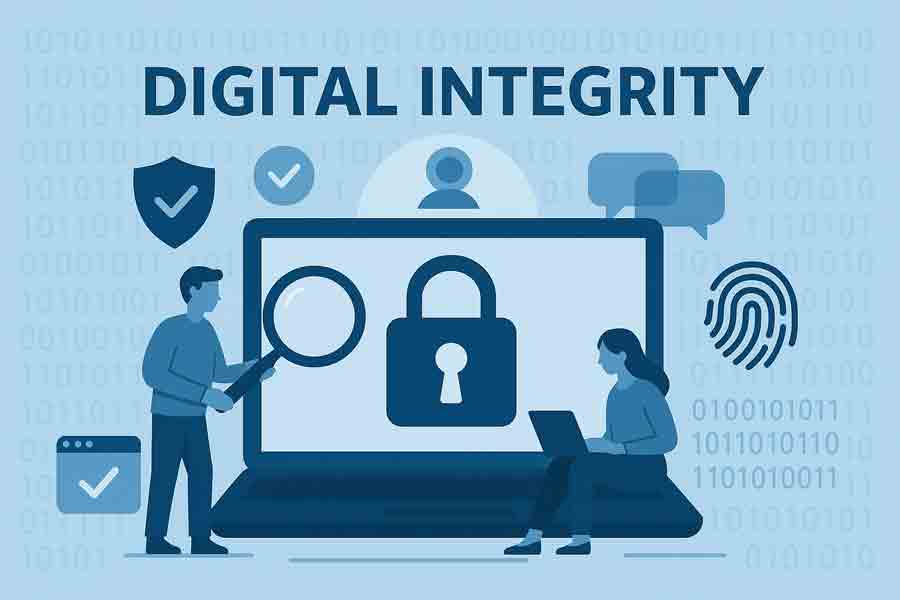
Published :
Updated :

We are living in an age where the transformation of life from physical world to digital is transitioning through various means such as artificial intelligence, blockchain technology, large language model so on and so forth, in a way which is unparalleled. And the way technologies are evolving it won't perhaps be an exaggeration to say that we cannot even contemplate now the kind of technological development we shall encounter in 10-15 years of time. In these unprecedented times it is pertinent to look at certain things that are inextricably linked with these remarkable and monumental transformations. Amongst those, digital integrity is seen as the most important element.
Digital integrity may be understood as the ethical and responsible use of technology that safeguards an individual's privacy, personal identity and related rights, while ensuring respect for human rights, data protection and the dignity of all those engaged in the digital sphere. Before examining it in detail, it is important to consider the broader context. The world is moving from paper-based to paperless systems, from analogue to digital processes, and from human-led to artificial intelligence-driven operations. Whether undertaken by individuals or by businesses recognised as separate legal entities, activities carried out on cloud-based platforms must be protected by strong legal safeguards. Our digital engagements can no longer be meaningfully separated from our in-person interactions. Indeed, the term 'real-life interaction', traditionally used to describe face-to-face contact, should be broadened to 'real-life engagement', encompassing both the digital and the physical dimensions of modern life.
Major tech firms like Meta, X (formerly Twitter), and LinkedIn each engage with aspects of digital integrity, though to varying degrees. Meta adopts a structured approach through transparency reporting and account integrity policies, supporting identity and platform governance. However, its recent move away from independent fact-checking weakens its commitment to information integrity. X, by contrast, has significantly reduced institutional oversight by disbanding its election integrity team and relying mainly on crowd-sourced moderation. This shift has raised concerns about the platform's ability to prevent misinformation and uphold truthful, trustworthy communication. LinkedIn, while not explicitly using the term 'digital integrity', promotes data accuracy and account authenticity through robust data governance and professional moderation.
While several major tech firms, such as Meta and LinkedIn, as mentioned above, have adopted internal governance frameworks that support digital integrity within their platforms, others like X have scaled back formal commitments to integrity and shifted towards user-led moderation. In these circumstances, it is essential for every country to develop a robust legal framework for digital integrity.
Many jurisdictions have introduced laws and policies that address aspects of digital integrity, though none have formally declared it a fundamental right except in two cantons of Switzerland. In the United Kingdom, the Online Safety Act 2023 imposes a statutory duty on online platforms to protect users, especially children, from harmful content. The European Union (EU), through instruments like the Digital Services Act (DSA) and the European Declaration on Digital Rights and Principles, fosters a value-based framework emphasising transparency and accountability in the digital space. In Switzerland, while the federal constitution does not recognise digital integrity, the cantons of Geneva and Neuchâtel have each amended their constitutions to guarantee the right to digital integrity.
In Swiss constitutional law, cantonal constitutions can include their own catalogue of fundamental rights in addition to those in the Federal Constitution. These cantonal fundamental rights are binding on cantonal authorities and judicially enforceable in the cantonal courts, and ultimately in the Swiss Federal Supreme Court, provided they are consistent with federal law.
Bangladesh's current legislative framework, by contrast, sheds light not on protection but on repression. The Information and Communication Technology Act 2006, followed by the Digital Security Act 2018 and later the Cyber Security Act 2023, have been widely criticised by human rights organisations for vague language and a tendency to curtail freedom of expression and digital autonomy. Although the interim government is preparing reforms including potentially recognising internet access as a civil right these remain piecemeal and risk perpetuating fragmented, coercive governance rather than enabling rights-based digital protection.
To truly safeguard citizens and elevate digital integrity to the level of a fundamental right, Bangladesh could follow the examples of Geneva and Neuchâtel. Amending the Constitution to explicitly enshrine the right to digital integrity protecting digital dignity, autonomy, privacy, and the freedom to be 'offline' when desired, would mark a profound step forward. Such a reform would not only demonstrate a clear commitment to protecting citizens' rights in the digital age, ensuring that technology serves people rather than exposing them to exploitation or abuse, but would also ensure that no future government could easily use digital laws or online platforms to silence its people a reality Bangladeshis have sadly witnessed far too often over the past 15 years under the Hasina government. It would be a way of affirming, once and for all, that our digital spaces belong to the people as well, not only to those in power.
Dr Mohammed Rakib-ul-Hassan is Professor, Geneva Business School, Adjunct Faculty, SSBM, Geneva; IMI, Luzern.
mohammed.hassan071117@gmail.com


 For all latest news, follow The Financial Express Google News channel.
For all latest news, follow The Financial Express Google News channel.